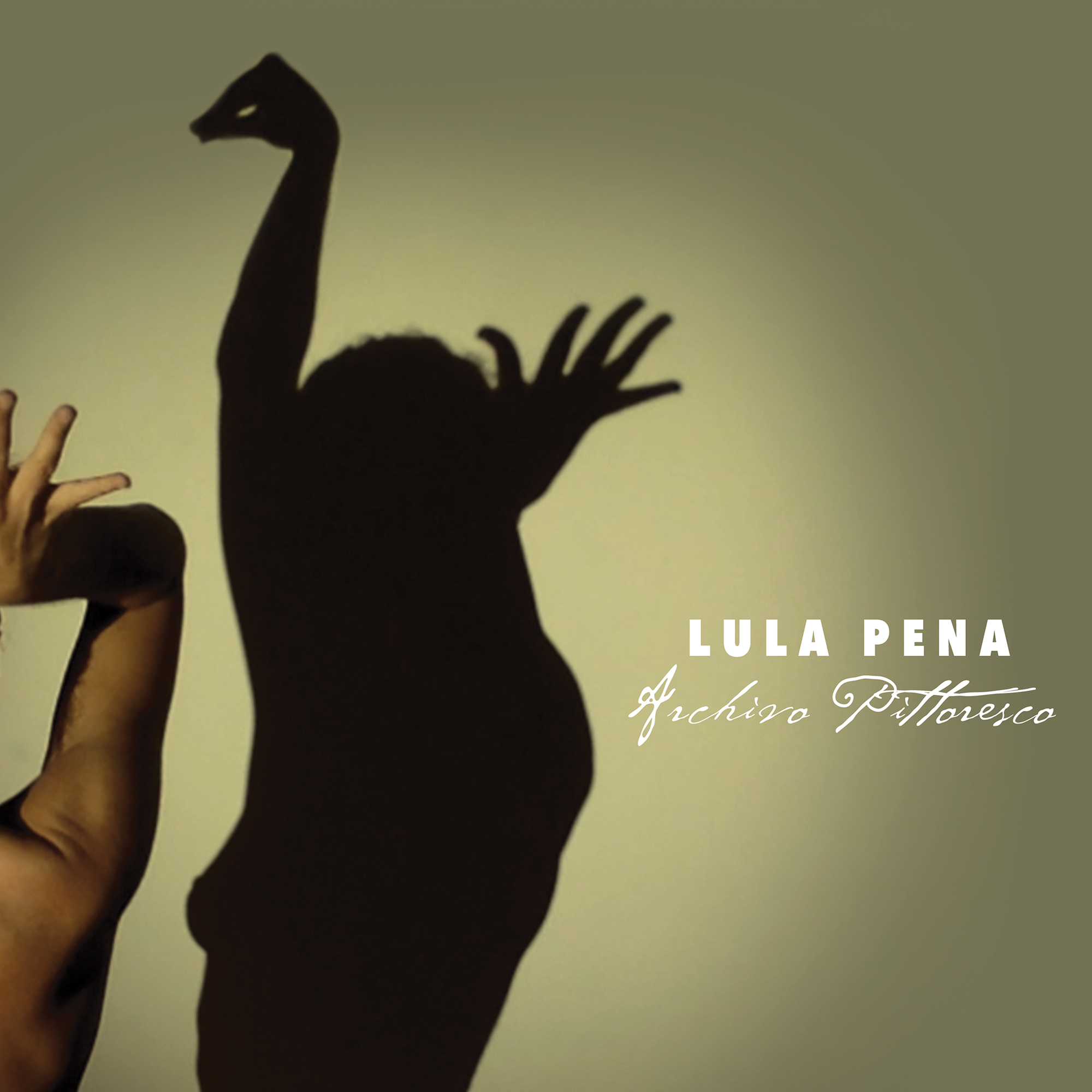
Lula Pena follows her own rules, not only in her career but in her very music. Her voice is haunting and moving, her guitar style unique, her approach deeply emotional yet also conceptual. She has a quasi-shamanic way of becoming one with her instrument when performing these long, rambling pieces, during which wood, string, words, human body, breath and voice all merge into a single, supernatural fabulous beast.
Lula Pena’s music is a living organism. It sails on a strange ocean, bordered by continents called folk blues, flamenco, French chanson, phado (that’s how she likes to spell it), bossa nova and others, grazing them all and leaving none intact.
Archivo Pittoresco wonderfully reflects Lula Pena’s inspired wandering: the album’s thirteen tracks often flow seamlessly into one another, as she sings (in Portuguese, French, English, Spanish, Greek, Italian) lyrics and poems by writers ranging from Manos Hadjidakis, Violeta Parra and herself to Belgian surrealist Scutenaire to the composers of the original Twilight Zone soundtrack and to many lesser-known names or anonymous authors.
Let’s follow the invitation contained in the last song title on the album, and “Come Wander with [Her]”
LULA PENA ON ARCHIVO PITTORESCO
With a free-floating open repertoire, a living body behaves differently in every performance. Being ephemeral, the various songs and fragments can connect in infinite ways. Exposed to the circumstances, the quality of the listening versus playing became one linear possibility in this album, just like a photo taken by chance.
Archivo Pittoresco is based on a movement of 19th century painters who explored landscape views and their organic elements, such as ruins, asymmetries, dissonances, uncertainties, shadows etc, an approach which I wanted to try in music. The same path - hands-on experience - wandering borderless and intuitively through different languages and sounds, intending to reach a sort of collective unconscious open source.
Destiny and destination become the same. I’m more interested in what things have in common, rather than what distinguishes them, aiming at the brain stem that I intuitively sense in all music. To reveal those hidden dimensions through the simplicity of voice and strings, is the subtle experience I want to share within our resonant bodies.
TRACK-BY-TRACK
Poema/Poème : One of my texts in French, where the sounds and meanings of the words graphically gives another semantic perspective, a third possibility of interpretation. Followed by a poem by Belgian surrealist Louis Scutenaire, which in turn gives a simple description of what it is. “Je suis de faim, mille” versus “Je ne suis pas d’une grande pauvreté”
Pesadelo da história is based on a text by contemporary Brazilian poet Ronaldo Augusto, which relates to the question of African heritage. It says: “The Black that I am, including my soul”, revealing the slavery we inflict on ourselves.
Ojos si quereis vivir is a song from the 17th or 18th century. A reminder to stay connected to spiritual dimensions. It basically says: trust what comes through your eyes and whatever departs from your eyes… what comes out of your heart will penetrate your heart, listening to silence as a step towards vision.
Las Penas : on the album, performances are separated into tracks, but the idea is that it is all just one piece, and this is a continuation from the previous song, based on a very old Mexican recording, one of the first Edison recordings. It’s about getting into emotions, and being more corporeal about that, so the notion of desire appears in these lyrics, right after the song about the spiritual realm.
Rose is by Ederaldo Gentil, a Brazilian composer who died last year. Rose is not only the name of a person, but of course also the flower, but by using ther Latin phonetics: “What happened to Rose?” might be understood as “what do you hear if you dare?” It is the courage to take an action. To leave one state for another. Like a word box that you open and all sorts of interpretations come out from inside this word, leading you to have different interpretations.
Ausencia (Absence) is a song by the great Chilean songwriter and ethnomusicologist Violeta Parra (who pioneered the revival and reinvention of Chilean and Latin American folk music). Absence is a paradox. Our minds and memories never let us be absent. I try to accomplish absence and presence at the same point, when I perform, I would prefer not to be there, but I am there… This process of musical expression is thinking in real time, in the moment, it allows us to be and not to be there, and it’s amazing when that happens.
Pes Mou Mia Lexi was written by illustrious Greek composer Manos Hadjidakis. The title means Give me the Word. I adopted it a few years ago, when Greece was the first EU country to experience economic collapse, and so we were all Greek, in a lexical world.
A Diosa (No potho reposare) is a traditional song from Sardinia, in dialect. Many years ago I performed there and someone was singing this song all the time, and I grabbed it, it stayed in my mind for 20 years or more, though I knew just two verses. And after all this time I felt I had to search for it, and I did. It begins by ‘I cannot relax, I cannot lie down’.
O ouro e a madeira means The Gold and the Wood. The lyrics say that the oyster lives in the mud and creates beautiful pearls, which is pure alchemical code. They further describe a kind of distillation or reduction process: “I didn’t want to be a field, it would be enough to be but the grain, not to be path but the short-cut, not to be the concert but the song...”.
Cantiga de amigo (Song of a friend). A genre from the medieval period, from the time of the troubadours, focused on female-voiced songs even if written by a man. It’s about discovering new ways of love. Love is wild and free but also mystical and symbolical, so you have that duality, these different levels. So many words for and about love were being invented at that time…
Deus e grande : meaning God is Big, Alla akhbar, etcetera. It’s a contemporary Portuguese poem, from a book called Recognition. It’s not about religion in the institutional sense, but about religion in the etymological Latin meaning: re-ligare, making connections, reconnecting. God is just the platform, the web, and you make your own connections, you make yourself believe or trust whatever you are capable of. Not believing might make you even more religious, because you are trying to make all kinds of connections of your own.
Breviário, or breviary. The word also means “resume”, “summary”. It’s about arriving, arriving by boat, stepping from sea to land. What is happening with this membrane between sea and land? These are words by a Brazilian woman essayist, Jerusa Pires Ferreira. She was challenged to write a poem from a photo of a sea view, and a boat arriving to a village. She wrote about the moments before and the after, giving life to that frame.
Come Wander With Me : this is from The Twilight Zone, a fragment of the original song from the series. In my concerts, this song used to start the set. An invitation to come and wander through these worlds. Now, on the album, it has become the last song… maybe it was intentional: a way to incite the listener to come to a live concert, and experience the travelling, the ritual of that direct contact with the performer, which cannot quite be experienced on a record.









